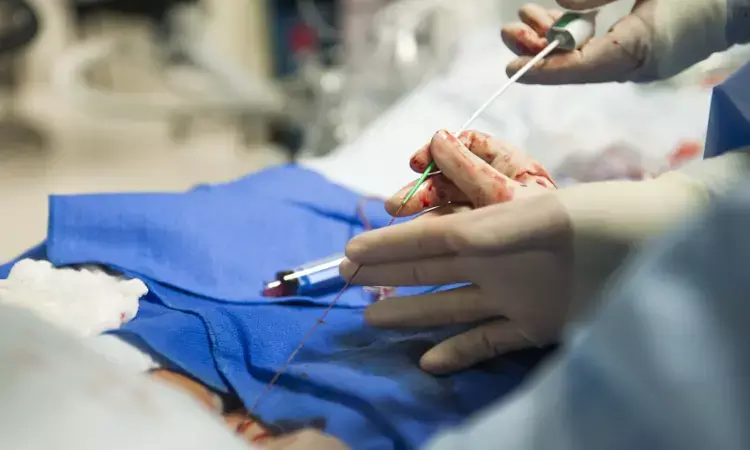- Home
- Medical news & Guidelines
- Anesthesiology
- Cardiology and CTVS
- Critical Care
- Dentistry
- Dermatology
- Diabetes and Endocrinology
- ENT
- Gastroenterology
- Medicine
- Nephrology
- Neurology
- Obstretics-Gynaecology
- Oncology
- Ophthalmology
- Orthopaedics
- Pediatrics-Neonatology
- Psychiatry
- Pulmonology
- Radiology
- Surgery
- Urology
- Laboratory Medicine
- Diet
- Nursing
- Paramedical
- Physiotherapy
- Health news
- Fact Check
- Bone Health Fact Check
- Brain Health Fact Check
- Cancer Related Fact Check
- Child Care Fact Check
- Dental and oral health fact check
- Diabetes and metabolic health fact check
- Diet and Nutrition Fact Check
- Eye and ENT Care Fact Check
- Fitness fact check
- Gut health fact check
- Heart health fact check
- Kidney health fact check
- Medical education fact check
- Men's health fact check
- Respiratory fact check
- Skin and hair care fact check
- Vaccine and Immunization fact check
- Women's health fact check
- AYUSH
- State News
- Andaman and Nicobar Islands
- Andhra Pradesh
- Arunachal Pradesh
- Assam
- Bihar
- Chandigarh
- Chattisgarh
- Dadra and Nagar Haveli
- Daman and Diu
- Delhi
- Goa
- Gujarat
- Haryana
- Himachal Pradesh
- Jammu & Kashmir
- Jharkhand
- Karnataka
- Kerala
- Ladakh
- Lakshadweep
- Madhya Pradesh
- Maharashtra
- Manipur
- Meghalaya
- Mizoram
- Nagaland
- Odisha
- Puducherry
- Punjab
- Rajasthan
- Sikkim
- Tamil Nadu
- Telangana
- Tripura
- Uttar Pradesh
- Uttrakhand
- West Bengal
- Medical Education
- Industry
Transcatheter Arterial Embolization safe & effective treatment for chronic refractory musculoskeletal pain

KISHORE et al found in a study that - TAE appears to be a safe and effective treatment for some types of chronic refractory musculoskeletal pain.
TAE is a minimally invasive procedure performed by interventional radiologists. TAE techniques have recently been deployed to treat painful musculoskeletal conditions due to abnormally inflamed or hypervascular tissues. The underlying theory is that by blocking the vascular supply, the pathologic tissue will involute. This tissue will therefore no longer be a nociceptive trigger or produce pro-inflammatory mediators, and thus pain will resolve.
PubMed, EMBASE, and Cochrane Central Register of Controlled Trials were searched by the authors for original research articles evaluating TAE in patients with musculoskeletal conditions from database.
Search terms employed were as follows: "embolization", "pain", "knee osteoarthritis", joint replacement, epi condylitis, tenderness, inflammation, WOMAC (Western Ontario and McMaster Universities Osteoarthritis Index), microspheres, Embozene, geniculate artery, neovascularity, transcatheter, embolic, imipenem/cilastatin sodium, angiogenesis, and "musculoskeletal".
Studies involving particle "embolization" for painful musculoskeletal conditions were included. Studies of TAE for hemarthrosis or malignancy-related "musculoskeletal pain" were excluded.
The observations in the study were:
• The primary search yielded 1,099 sources; 7 articles and 4 abstracts were included for data extraction.
• All were cohorts or case series, with low risk of bias and moderate to poor level of evidence.
• Heterogeneity between studies was high, precluding meta-analysis.
• The reviewed studies reported the safety and efficacy of TAE for the treatment of "knee osteoarthritis"; adhesive capsulitis of the shoulder; tendinopathy/enthesopathy of the knee, shoulder, elbow, and ankle; and cervical myalgia.
• All TAEs were reported as technically successful without major complications or subsequent serious adverse events, including no reported osteonecrosis, cutaneous ulceration, limb ischemia, cartilage degeneration, or myotendinous injury.
• TAE significantly reduced pain and improved function for all of the treated conditions, with durable response up to 24 months post procedure.
The authors opined that - TAE is a novel intervention that could transform clinical care and shift the current paradigm for treating non-malignant "musculoskeletal pain". If TAE proves to be as effective and safe as suggested by these early studies, it may have an important role in the treatment of chronic "musculoskeletal pain".
Further reading:
Transarterial Embolization for the Treatment of Chronic Musculoskeletal Pain: A Systematic Review of Indications, Safety, and Efficacy
SirishA. Kishore, Dina Sheira, Michaela L. Malin, David W. Trost, and Lisa A. Mandl
ACR Open Rheumatology Vol. 4, No. 3, March 2022, pp 209–217
DOI 10.1002/acr2.11383
MBBS, Dip. Ortho, DNB ortho, MNAMS
Dr Supreeth D R (MBBS, Dip. Ortho, DNB ortho, MNAMS) is a practicing orthopedician with interest in medical research and publishing articles. He completed MBBS from mysore medical college, dip ortho from Trivandrum medical college and sec. DNB from Manipal Hospital, Bengaluru. He has expirence of 7years in the field of orthopedics. He has presented scientific papers & posters in various state, national and international conferences. His interest in writing articles lead the way to join medical dialogues. He can be contacted at editorial@medicaldialogues.in.
Dr Kamal Kant Kohli-MBBS, DTCD- a chest specialist with more than 30 years of practice and a flair for writing clinical articles, Dr Kamal Kant Kohli joined Medical Dialogues as a Chief Editor of Medical News. Besides writing articles, as an editor, he proofreads and verifies all the medical content published on Medical Dialogues including those coming from journals, studies,medical conferences,guidelines etc. Email: drkohli@medicaldialogues.in. Contact no. 011-43720751


